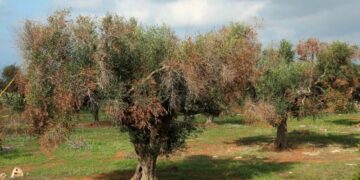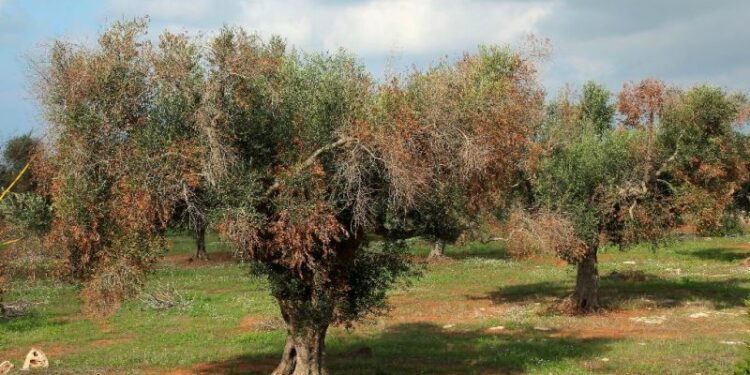Η Διεύθυνση Αγροτικής Οικονομίας και Κτηνιατρικής της Περιφερειακής Ενότητας Κοζάνης ενημερώνει τους υπόχρεους (φυτώρια, σημεία πώλησης καλλωπιστικών φυτών και πολλαπλασιαστικού υλικού, εταιρειών διεθνών μεταφορών, παραγωγών, συνεταιρισμών, γεωπόνων του δημοσίου και ιδιωτών, τελωνιακών, Δήμων και Εργολάβων δημοσίων κηποτεχνικών έργων) για τα νέα δεδομένα σχετικά με τoν Επιβλαβή οργανισμό καραντίνας Xylella fastidiosa, που έχει επιβεβαιωθεί σε αρκετά φυτικά είδη μεταξύ των οποίων σε Olea europaea L. (Ελιά), Prunus amygdalus Batsch (Αμυγδαλιά), Nerium oleander L. (Πικροδάφνη) και Quercus sp. L. (είδη βελανιδιάς).
Συγκεκριμένα:
- Γνωστοποίηση πρόσφατου νέου κρούσματος του Επιβλαβή Οργανισμού Καραντίνας Xylella fastidiosa στην Περιφέρεια της Μαδρίτης της Ηπειρωτικής Ισπανίας (σε ελαιώνα ηλικίας 8 ετών).
- Γνωστοποίηση πολύ πρόσφατου νέου κρούσματος του Επιβλαβή Οργανισμού Καραντίνας Xylella fastidiosa στην Περιφέρεια της Ανδαλουσίας της Ηπειρωτικής Ισπανίας (διαπιστώθηκε σε φυτά Polygala myrtifolia σε θερμοκήπιο).
Ενημέρωση σχετικά με τα αποτελέσματα του Ελέγχου που διενήργησε η Επιτροπή της Ε.Ε. στην περιοχή του Αλικάντε της Ηπειρωτικής Ισπανίας. Σύμφωνα με την ενημέρωση της Επιτροπή προς τα Κράτη Μέλη κατά τη συνεδρίαση της Μόνιμης Επιτροπή Φυτοϋγείας μηνός Μαρτίου 2018 προκύπτουν τα εξής:
α) η πλήρης έκταση της οριοθετημένης ζώνης στο Αλικάντε είναι ακόμη άγνωστη,
β) οι καθυστερήσεις στην εφαρμογή των μέτρων εξάλειψης δημιουργούν κίνδυνο περαιτέρω εξάπλωσης,
γ) η εμφάνιση νέων κρουσμάτων στην περιοχή συνεχίζεται.
- Την Εκτελεστική Απόφαση της Επιτροπής 2015/789/ΕΕ, σχετικά με μέτρα για την πρόληψη της εισαγωγής και της εξάπλωσης στην Ένωση του Οργανισμού Xylella fastidiosa.
Ο συγκεκριμένος οργανισμός έχει μολύνει περίπου το 10% στου συνόλου των ελαιοδέντρων στην περιφέρεια της Απουλίας στην Ιταλία και στη συνέχεια διαπιστώθηκε στη Γαλλία, στη Γερμανία και στην Ισπανία.
Τονίζεται ότι, στη Ελλάδα δεν έχει διαπιστωθεί μέχρι σήμερα η παρουσία του παθογόνου Xylella fastidiosa, όμως η διαπίστωση της παρουσίας του σε όλο και μεγαλύτερο αριθμό χώρων της Ε.Ε. οδηγεί τις φυτοϋγειονομικές υπηρεσίες της Χώρας σε αυξημένη ετοιμότητα για να αποτραπεί ο κίνδυνος της εισαγωγής και εξάπλωσής του. Συνεπώς η διατήρηση της Χώρας απαλλαγμένης από το επικίνδυνο βακτήριο είναι θέμα Εθνικής Σημασίας και Ύψιστου Δημόσιου Συμφέροντος.
Υπενθυμίζουμε ότι η Xylella fastidiosa κατατάσσεται στην κατηγορία των επιβλαβών οργανισμών μέγιστου ρίσκου για την Ελλάδα, που αν εγκατασταθεί θα έχει δυσβάσταχτες οικονομικές συνέπειες και τεράστιες επιπτώσεις στο αγροτικό οικοσύστημα και στον τουρισμό.
Τα συμπτώματα που προκαλούνται από το βακτήριο ποικίλλουν ανάλογα με το φυτό ξενιστή. Γενικά, καθώς το βακτήριο προσβάλλει τα αγγεία του ξύλου και εμποδίζει τη μεταφορά νερού και ανόργανων θρεπτικών στοιχείων, τα ασθενή φυτά εκδηλώνουν συμπτώματα μαρασμού, νέκρωσης (καψαλίσματος) και ξήρανσης του φυλλώματος, ακολουθούμενα τελικά από την πλήρη νέκρωση του φυτού. Σημειώνεται ότι μεγάλος αριθμός φυτών είναι δυνατόν να προσβληθούν χωρίς να εμφανίσουν συμπτώματα.
Στην Ιταλία έρευνες έδειξαν ότι τα συμπτωματικά ελαιόδενδρα είχαν προσβληθεί από ένα σύμπλοκο παθογόνων: X. fastidiosa, διάφορα είδη μυκήτων που ανήκουν στα γένη Phaeoacremonium and Phaemoniella, και το λεπιδόπτερο Zeuzera pyrina, και η ασθένεια ονομάστηκε «Σύμπλοκο της ταχείας αποξήρανσης της ελιάς».
Περισσότερες Πληροφορίες για τα συμπτώματα καθώς επίσης και πλούσιο φωτογραφικό υλικό περιλαμβάνει το έντυπο που έχει αναρτηθεί στην ιστοσελίδα του Μπενακείου Φυτοπαθολογικού Ινστιτούτου: www.bpi.gr > ΥΠΗΡΕΣΙΕΣ > Επισκοπήσεις > Κατευθυντήριες Οδηγίες Μακροσκοπικών Ελέγχων > Βακτήρια/Φυτοπλάσματα > ΟΔΗΓΙΕΣ Xylella fastidiosa
Λόγω της σοβαρότητας του παθογόνου και της σημασίας της καλλιέργειας των φυτών ξενιστών στη χώρα μας, παρακαλούμε τους υπόχρεους να ενημερώνουν την Υπηρεσία μας:
- Κατά την εισαγωγή φυτών προς φύτευση στη χώρα μας, από χώρες στις οποίες έχει γνωστοποιηθεί η παρουσία του, προκειμένου να διενεργηθούν οι επίσημοι έλεγχοι.
- Στην περίπτωση που διαπιστώσουν ύποπτα συμπτώματα (σε φυτά προς φύτευση στα φυτώρια και κατά τη διακίνησή τους, καθώς επίσης και στους οπωρώνες) όπως αναφέρθηκαν παραπάνω.
Σύμφωνα με την ισχύουσα φυτοϋγειονομική νομοθεσία (Π.Δ.365/2002-ΦΕΚ 307 Α) οι υπόχρεοι οφείλουν να γνωστοποιούν στην αρμόδια αρχή (Δ/νση Αγροτικής Οικονομίας & Κτηνιατρικής) οποιαδήποτε ασυνήθιστη εμφάνιση επιβλαβών οργανισμών ή συμπτωμάτων ή κάθε άλλη ανωμαλία που αφορά τα φυτά.
Οι ενδιαφερόμενοι για οποιαδήποτε πληροφορία μπορούν να απευθύνονται στην Δ/νση Αγροτικής Οικονομίας και Κτηνιατρικής Π.Ε. Κοζάνης, Τμήμα Ποιοτικού & Φυτοϋγειονομικού Ελέγχου.


























